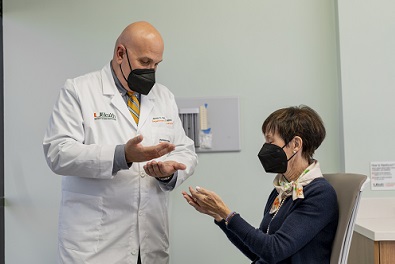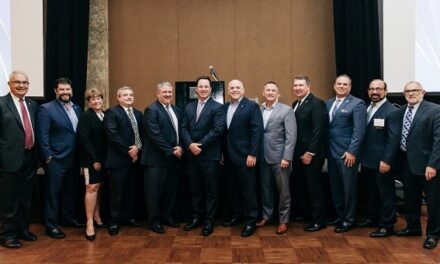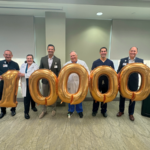The University of Miami Miller School of Medicine as opened the new Comprehensive Center for Brain Health, which will serve as an important research hub for Alzheimer’s, dementia and other memory disorders. Led by UM professor of neurology and Center Director Dr. James Galvin, M.D., M.P.H., this new center will focus on research and treatment of neurogenerative brain diseases. They will also provide medical care for patients with these diseases.
What sets the center apart most notably is Dr. Galvin’s passion for attending to brain health on a preventative basis. “It is time we did more to help people protect their brains,” he said.
Toward this end, Dr. Galvin and his team are working to understand individuals’ risks for developing diseases common age-related neurodegenerative diseases such as mild cognitive impairment, Alzheimer’s disease, Parkinson’s disease, Lewy body dementia, frontotemporal degeneration, vascular cognitive impairment, and chronic traumatic encephalopathy.

The transdisciplinary staff includes neurologists, nurse practitioners, physical therapists, licensed clinical social workers, coordinators, a biochemist, epidemiologists, public health researchers, and data scientists, a gerontologist and a data scientist.
The center will run trials where people who have healthy brains and those with cognitive and functional impairments can all participate. “We have developed innovative and novel tools to create an individual profile of brain health risks and can offer what is tantamount to a personalized program to mitigate risks for each person, said Dr. Galvin”
The new center augments patient care and research within the University of Miami’s Division of Memory Disorders, the McKnight brain center and the Center for Cognitive Aging and Neuroscience. “Collectively, we’re all interested in brain health and in having a world without Alzheimer’s disease,” said Dr. Galvin.
A Quest to Avert Tragedy
Treatment and care of patients with Alzheimer’s costs $305 billion annually in the U.S. Unless there are significant medical breakthroughs, by 2050 that number may skyrocket to $1.1 trillion per year, as both the per capita incidence of dementia grows and baby boomers enter their 80s and 90s.
“The enormous financial burden aside, the tragedy these diseases impose on seniors and their families is played out in one out of every three families,” said Dr. Galvin. “Some of this is preventable now, perhaps up to 40% of the risk of developing a degenerative brain disease. It is important that we take a multipronged approach to prevent disease and slow progression, while also working to develop better treatments and cures,” Dr. Galvin said.
Dr. Galvin was inspired to study the aging brain by his own experiences with his grandfather’s decline from Parkinson’s and later, dementia. “I grew up in a house where my grandparents lived upstairs, and I was very close with my grandpa,” he said. “His Parkinson’s led us into a car wreck that was fortunately not catastrophic, but was a wake-up call that something was wrong. Over the years that followed, I watched someone who was really vital and active become progressively more and more disabled from this disease.”
“I decided to devote my career to doing something about it, to try to figure out why some people develop these diseases and what we can do to try to treat them, prevent them or cure them,” he said.
Measuring Brain Health
To quantify brain health, Dr. Galvin and his team currently employ several, which include The Quick Physical Activity Rating, The Lewy Body Composite Risk Score, Cognitive and Leisure Activities Scale, Number-Symbol Coding Test and The Quick Dementia Rating System.
Recently, he led a study that established a broad and comprehensive measure of brain health, that he named the Resilience Index (RI). This index goes further than the current tools by predicting an individual’s risks of developing an impairment, and drives a personalization plan for optimizing their brain health. These “brain prescriptions” may include specific goals for physical activity, cognitive activity, diet, and even mindfulness practice.
“I think there is an increased interest in thinking about what people could do to try to prevent diseases from developing,” Dr. Galvin said. “People are asking, ‘How can I build a better brain as I get older?’ We know that there are things that are potentially modifiable. I can’t change your age, I can’t change your biologic sex, I can’t change your genes, but there are a bunch of factors that seem to provide some protection against disease.”
Having developed the RI, Dr. Galvin plans to roll the program out to people in the South Florida area at no cost and later, beyond the region. People can participate and they get very detailed, comprehensive assessment at no cost to them. At the end of the research visit, they get feedback that they can take back to their own doctor or if they choose to, they can follow up with our clinicians.
Multicultural Bandwidth
Dr. Galvin says they are also working on tools to improve the recognition and diagnosis of dementia and how those tools perform in multicultural communities. “We will be looking across all groups, and at people from all walks of life. These populations include African Americans and Afro Caribbeans, Hispanics, people who live in rural areas, Native Americans and people in American Samoa” he said. “We are really trying to understand not just how we recognize the disease in the majority individuals, but how to recognize disease in all people.
More on the CCBH:
If you are concerned about your memory or that of a loved one, consider participating in our no-cost research evaluations to provide you the answers you seek. A summary can be provided that you can share with your healthcare provider, or you can see one of our clinicians for follow-up care and management. We offer innovative research programs including longitudinal studies, industry-sponsored clinical trials, innovative investigator-initiated projects, lifestyle interventions such as Tai-Chi, ballroom dancing, or yoga, biomarker development, genetic studies, and much more. We sponsor community seminars to provide important information in clinical care and research advances. You can become part of the CCBH family by joining our auxiliary or, if interested, supporting our research and clinical programs.
For more information on the Comprehensive Center for Brain Health, visit https://umiamibrainhealth.org.


























